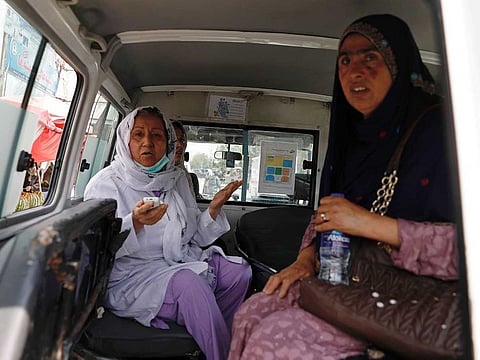Dozens dead as mothers, infants and mourners targeted in Afghanistan
Attacks at funeral, hospital come a day after roadside bombs explode in Kabul

Kabul: Gunmen stormed a maternity hospital in the Afghan capital Tuesday, killing at least 14 people - including newborns and nurses - as a suicide blast at a funeral in the country's restive east left two dozen mourners dead.
The latest violence comes as Afghanistan grapples with myriad crises, including a rise in militant operations across the country, a surge in coronavirus infections, and a reduction in foreign military support.
Three gunmen held siege at the Barchi National Hospital in Kabul for hours after the early-morning attack before security forces killed them in a clearance operation, the interior ministry said.
Heavily armed security forces were seen carrying infants away from the scene - at least one wrapped in a blood-soaked blanket.
"The fatalities also include mothers and nurses," interior ministry spokesman Tareq Arian said.
Some 15 people were wounded and more than 100 - including three foreign nationals - were rescued, he said.
The hospital is located in the west of the city, home to the capital's minority Hazara community - a frequent target of militants from Daesh.
A paediatrician who fled the hospital told AFP he heard a loud explosion at the entrance of the building.
"The hospital was full of patients and doctors, there was total panic inside," he said, asking not to be named.
The hospital is supported by the humanitarian organisation Doctors Without Borders (MSF), and a number of foreigners were working at the hospital.
Health sector caught in the crossfire
Tuesday's attack was the latest hitting the country's already stretched health sector, with facilities and medical personnel frequently caught in the crossfire during decades of war in the country.
"We call on all sides to stop attacking hospitals and health workers," said deputy health minister in the city, Waheed Majroh.
Around an hour after the Kabul assault, a suicide bomber killed at least 24 people at the funeral of a local police commander in eastern Nangarhar province, according to provincial spokesman Ataullah Khogyani.
The attacker detonated explosives in the middle of the ceremony.
Amir Mohammad, who was wounded in the blast, said thousands of people had gathered for the funeral, an event that often draws huge crowds in Afghanistan.
The Taliban denied involvement in either attack.
Offensives against Daesh
The violence comes just a day after four roadside bombs exploded in a northern district of Kabul, wounding four civilians including a child.
Those bombings were later claimed by the Daesh group, according to the SITE intelligence group.
They were just the latest in a string of Daesh attacks on the capital.
In March at least 25 people were killed by a gunman at a Sikh temple in Kabul in an attack later claimed by the group.
Daesh was also responsible for an infamous attack in March 2017 on one of the country's largest hospitals, when gunmen disguised as doctors stormed the Kabul building and killed dozens.
The group has recently suffered mounting setbacks after being hunted by US and Afghan forces as well as in Taliban offensives targeting their fighters, but it still retains the ability to launch major assaults on urban centres.
The Taliban have largely refrained from launching major attacks on Afghan cities since February, when they signed a landmark withdrawal deal with the US meant to pave the way for peace talks with the Kabul government.
Under the agreement, the Taliban promised not to target forces from the US-led coalition, but made no such pledge toward Afghan troops and have stepped up attacks in the provinces.
The deal will see all US and foreign forces leave Afghanistan over the next year. Thousands of US troops have already gone, with a drawdown to 8,600 expected within months.
In October 2015 US air strikes destroyed an MSF hospital in the northern city of Kunduz, killing 42 people. The city had earlier been seized by the Taliban.
Sign up for the Daily Briefing
Get the latest news and updates straight to your inbox



